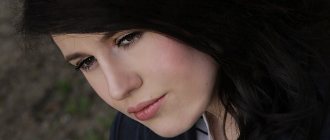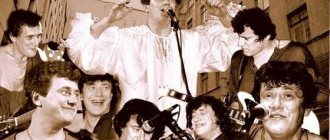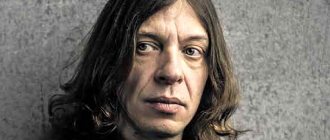Biography of Sevara Nazarkhan
Sevara Nazarkhan is one of the most successful pop singers in the history of modern Uzbekistan.
Her songs are known and popular outside of her home country. The geography of her tours stretches from Asia to Europe. Her talent is undeniable, however, it seems that her current popularity is just the beginning. After all, this bright Uzbek singer probably has something to say to the world. Anticipating events, today we will present to your attention the life story of Sevara Nazarkhan - without a doubt, the best singer of sovereign Uzbekistan.
Sevara's childhood
Sevara Nazarkhan was born in sunny Andijan. The family of the future singer consisted entirely of representatives of creative professions, and therefore from her earliest years the life of the young girl was saturated with music. The role of her mother was especially important in the fate of Sevara Nazarkhan. As a music teacher, she often gave her daughter vocal lessons, helping with advice in other areas. Thus, already at an early age, the future singer received the necessary basis of knowledge, which helped her in her future career.
Sevara Nazarkhan - participant in the show The Voice
Her father also took part in the development of Sevara. From a very early age, he played her the dutar, an ancient Uzbek instrument, instilling in the girl a love of Asian folk music.
So, thanks to the influence of her parents, Sevara began to get involved in music. In 1998, the girl moved to Tashkent, where she submitted documents to the State Conservatory of Uzbekistan. Here she continued to develop her innate talent and study the characteristics of stage vocals. In some ways, this period became the period of formation of Sevara Nazarkhan as a professional singer. While studying at the conservatory, she made many connections and very soon began performing on the big stage.
Childhood and youth
Sevara Nazarkhan was born in December 1976 in Uzbekistan, in the provincial town of Asaka. The girl grew up in a creative family of Uzbek nationality. My father sang and played an ancient folk instrument, the dutar, and my mother taught vocals at a music school. Her mother gave her daughter her first singing lessons.
Uzbek singer Sevara Nazarkhan
In 1998, Sevara submitted documents to the Tashkent Conservatory, where she successfully passed exams and studied until 2003. It is here that the girl becomes a professional singer. Thanks to the connections she made during her studies, her career as a performer is developing rapidly. Soon Sevara will perform on the big stage.
Becoming a pop singer Sevara Nazarkhan and first success
According to some reports, Sevara Nazarkhan began her professional career with jazz.
Performing in the evenings in bars and restaurants in Tashkent, the girl performed classic jazz compositions by Louis Armstrong and Ella Fitzgerald, for which she received her first singing fees. As a jazz singer, Sevara became well known in certain circles, and therefore very soon began to receive her first serious offers from directors and producers in Uzbekistan. While still a student, she performed one of the main roles in the Tashkent musical “Maysara - Superstar”, and soon became part of the female group Sideris, in which she sang along with three other girls. Despite the fact that People's Artist of Uzbekistan Mansur Tashmatov was behind this project, the group did not become widely popular and some time later ceased to exist. Despite this fact, the designated period in Sevara’s work can hardly be called a failure. She gained the necessary experience and acquired numerous connections. All this will subsequently greatly help her when building a solo career.
Sevara Nazarkhan - Where I am not
Creative activity
Sevara’s singing career begins with the girl’s quartet “Sideris”, the founder and producer of which was Mansur Tashmatov, widely known in Uzbekistan. The young singer did not receive much satisfaction from working in it, and it quickly fell apart.
For some time the girl has been singing jazz and performing modern folk compositions on dutar. Her fame begins to grow. But they really started talking about her after performing one of the main roles in the musical “Maysara - Superstar”.
And then the rising star commits what she calls an eccentric act - she uses her last money to fly to London and take part in an ethnic festival. But this act brought her a meeting with a significant person.
During the performance, a man films everything on camera. It turned out to be the famous musician Peter Gabriel, who turned Sevara’s whole life upside down and pushed her to fame.
Peter helps the original singer record a solo album and organizes a world tour, which included the countries of Western Europe, the USA and Canada, and subsequently Russia and China.
Sevara becomes super popular in her homeland, performs a lot, writes music, and releases albums. One of the few Uzbek artists who managed to achieve such recognition. In 2002, she was awarded the title of Honored Artist of the Uzbek Republic. Boris Grebenshchikov and Vyacheslav Butusov considered it an honor to sing with her.
She lives and breathes music, creates only according to inner command, even if she is not always understood. He sings about beauty, about love, about what keeps us all on this earth. The composer's music contains an incredible synthesis of ethnic and modernity.
But, unfortunately, Sevara is popular only at home and abroad, and her work is mostly unknown to the Russian audience. She decides to participate in the show “The Voice”. The project did not submit to her, but brought it to the crest of popularity, the singer won with great love from the audience. Igor Nikolaev’s romance “I’m Not There,” masterfully performed in the second round, instantly soared to the top of the charts.
Solo career of Sevara Nazarkhan
Sevara's ascent to the heights of the musical Olympus was bright and rapid.
In 2000, the girl recorded the album “Bahtimdan”, which instantly became popular throughout Uzbekistan. This was followed by a performance at the international ethnic music festival Womad, during which the singer met English musician Peter Gabriel, who invited the Uzbek artist to record a solo album at his Real world Records studio. Thus, a few months later, Sevara’s second album, “Yol Bolsin” (“Have a nice journey”), was recorded in London. The music producer of the record was the famous French musician Hector Zazu. As a result, the success of the new album exceeded all expectations. The Uzbek singer's album was warmly received by the European public, and very soon Sevara Nazarkhan went on a tour of Western countries.
The tour, called Growing Up, included performances at the best venues in the USA, Canada and Western Europe. In 2005, on the wave of success, Sevara Nazarkhan became the winner of the BBC World Music Award, within which she was recognized as “Best Artist in Asia”.
After this, the Uzbek singer turned her gaze to the east. The performer's concerts took place in Russia, China and other Asian countries.
Participants in the Vyshka show: Sevara Nazarkhan, singer In 2006 and 2007, two new albums by Sevara Nazarkhan appeared on the shelves of music stores around the world - “Bu Sevgi” and “Sen” (the latter was recorded in collaboration with producers Bruno Ellingham and Victor Sologub). The releases turned out to be successful, although in Sevara’s native Uzbekistan there were still voices of critics who called the pop performance of folk music blasphemy. However, few of the artist’s fans took such remarks seriously.
Singer Sevara about false patriotism, imposed religion and belated self-love
vk.com/sevaranazarkhan Having become one of the most popular performers in Uzbekistan, Sevara did not stop there. Lively and ambitious, the girl went to Europe “for luck” and was not mistaken. In London, a significant meeting for her career took place with Peter Gabriel. It was he who organized the world tour of the young singer, which died down at the largest venues in Europe, the USA and Canada. In 2004, the performer won the “Best Asian Artist” category under the auspices of the prestigious BBC World Music Award.
During the conversation, Sevara told AN about the secret of her success, new projects and how it turned out that she went to “The Voice” “for fun.”
— With such regalia and an “army” of fans, you can safely be called a diamond of the Uzbek stage. Sevara, do you consider yourself a star?
“You know, I’ve thought so since childhood. Although over time I still came to the conclusion that every person is a star. Apparently I am gradually becoming a philosopher.
— You are the first Uzbek singer who began working abroad with famous performers, producers, and musicians. Didn't you get the shivers?
- Of course, I was scared. There just came a moment in my life when the adventurer in me woke up, and Tashkent became boring. Without money or connections, I went on a kind of journey to see people and show myself. However, luck did not keep itself waiting. True, in most cases I didn’t know what this or that famous artist or producer looked like, so I didn’t go out of my way to make an impression. I was simply bursting with the desire to sing, to tell the audience my story, and I was “burning” like a lantern. Perhaps this largely influenced how everything turned out in the end.
- Do you believe in chance?
— In my opinion, chance goes hand in hand with unconsciousness. I do not share these concepts with each other. In general, what happens in life should be perceived not only as a lesson, but also as a key to understanding yourself, first of all. It happens that a person lives simply for the thrill. I don't want that. It is very important to enjoy what you do, but no one has canceled work, including on yourself. I am especially irritated by the popular lamentations today: “We live in the name of God!” etc. and so on. I want to come right up and beat him with a baton. Why do people shout about their religion and propagate it?
— What prompted you to participate in popular Russian shows such as “The Voice”, “Exactly”?
— I would rate my participation in these projects as childish. In principle, I didn’t realize, especially at the initial stage, how serious everything was. And now I understand what a great school it was. I went to “The Voice” purely for fun. I suspect that the Russian audience received me well, because I already had good material, which I presented properly. And then some incomprehensible Uzbek woman came on stage, planning to sing in Russian. (laughs)
- How does Sevara live now?
- Now, I guess I live with children. And yet the light bulb went off for me. Otherwise, for a long time I didn’t even realize what kind of creatures these were – children. In my opinion, this is an amazing responsibility. You take care of them, educate them, give them a kick, of course, when necessary. Along with family, profession plays an important role in my life. At the moment I am involved in modern opera - a large-scale and complex project. For me this is another “bar”. In general, ambition is a good motive for creativity. It is important to be not just a talented singer, but an author, to “breathe” your music, to fill it with what is “seething” in you. This is what I will do all my life. We can “stuff” the body with food, but with the soul it is much more difficult. It requires special food, and on a “starvation ration” it can inadvertently die, in which case the person begins to literally “throw away” through this life. Everyone understands that it is necessary to love yourself, but I learned this knowledge quite late.
—What is your viewer like?
- First of all, “alive”! The viewer, as they say, “lives with me”: we rejoice, cry, and worry together. On stage, the performer has his own tasks, we are not clowns to entertain the audience, this must be understood. I try to “loose my grip” and move through life quite easily. Otherwise, all you will do is freak out about what is happening.
- Do you sing at home?
— Sometimes, of course, I do especially well in the shower. (laughs) But seriously, it’s basically a work process that doesn’t subside at home.
— You’ve lived a lot of places, you’ve seen a lot of things. Which country turned out to be the most comfortable for you?
- Interest Ask. I am most comfortable when I am alone with myself, namely in my heart. My homeland is in it. And this hyped-up patriotism, when they start shouting with foam at the mouth and flags about who they are and where they come from, causes nothing but rejection. Yes, if you were just a person, no matter where you lived, that’s the whole story.
— Will your children continue the musical dynasty?
“The main thing for them is to be spiritually developed and educated, then they themselves will find their way in life and will not get lost.” Soul and mind are a paired “dance”, not a solo one. This is what my husband and I are working on now. I am a good friend to my guys; our father is the strict one in our family.
Support us - the only source of reason in these difficult times
Stay with us. Add us to your sources and subscribe to our social networks.
Yandex News Google News MirTesen Yandex Zen Twitter Telegram VKontakte Odnoklassniki Facebook Instagram
Sevara Nazarkhan now
In 2010, under the pseudonym “Sevara & Elf”, the album “So Easy” was published - the singer’s first Russian-language record.
After this, the artist began to appear more often in Russia and perform live concerts. In 2012 and 2013, Sevara Nazarkhan took part in several television projects on Russian television, including the “Voice” and “Higher” programs. These appearances strengthened the popularity of the Uzbek singer and attracted additional attention to her songs and concert programs. Sevara Nazarkhan’s latest album at the moment is the album “Tortadur”, which consists of Uzbek folk songs. The recording of this record took place in Uzbekistan. The collected material was mixed by specialists from London's Abbey Road Studios.
Eclectic Elf
Uzbek singer Sevara Nazarkhan is invited to record by Peter Gabriel and Boris Grebenshchikov. Her records are produced by Hector Zazu and Victor Sologub. And the BBC recognized Sevara as the best Asian artist in the genre of world music.
Not long ago, music critics were excited by Sevara Nazarkhan’s first Russian-language album “So Easy,” released under the guise of “Sevara and the Elf” (the singer explains that the Elf is her other self), in which they discerned first-class pop, which has long been uncharacteristic of our latitudes. The album was recorded in London, Tashkent, Moscow and New York. Among others, “Moral Code” guitarist Nikolai Devlet-Kildeev, Tequilajazzz sound engineer Andrey Alyakrinsky and producer Bruno Ellingham, who previously collaborated with Goldfrapp and Doves, assisted in the recording. The texts for Sevara's melodies were written by Sergei Mikhalok from Lyapis Trubetskoy, Boris Grebenshchikov, Vadim Stepantsov and Karen Kavaleryan.
Lenta.Ru talked with the singer and learned about her attitude to the world music genre, musical preferences and reference points, and eclectic life.
— How did your musical career begin in your native Uzbekistan?
— Everything happened very naturally. My parents are both musicians. Mom teaches a rubab class. This is a Central Asian string instrument. And dad worked at a music school and as an editor at national radio. That is, music and everything connected with it have always been with me. And then a music school and a conservatory, work in a dutarist ensemble (another string instrument) at the radio committee, the first pop group with conservatory friends. And almost unnoticed by myself, I became an independent artist when in 2000 I gave my first solo concert in Tashkent.
— What brought you to the genre of world music? And how did you end up in the “stronghold of the genre” - on Peter Gabriel's Realworld Records label?
— I am biased towards the concept of world music. All I did and do is, along with my “modern” songs, I sing folk classical compositions, I simply adore them. Naturally, experiments are made with sound, attempts at new arrangements. Therefore, as in that bad joke - I looked - world music, and looked closer - an Uzbek classical song! And the more mature I become, the more I like a classic song without any confusion. So I recorded a new album - just a set of songs that I love. And no electronics. I took it to my friends for information - I hope everyone will be able to hear them soon. And I ended up at Realworld Records almost by accident: I came to the WOMAD festival in England (the World of Music, Arts and Dance festival was founded by Peter Gabriel. - Note by Lenta.Ru), I wanted to listen to Khaled, Youssou N'Dour and others. And it turned out that there was a no-show - one singer was unable to fly. Someone told the festival management that they saw Sevara in the audience. They found me through paging and asked if I could act as a replacement. The next day, together with the local drummer and bassist, we had a jam (there’s no other way to call it), and the audience seemed to like it. And Peter Gabriel was in the crowd. The next day we agreed at the studio to release the album.
— What prompted you to record a Russian-language album, and even in the genre of pop music?
— I studied in a Russian class, a significant part of my friends are Russian speakers. Along with Uzbek cultural values, I grew up listening to Winnie the Pooh with Leonov’s voice, Gaidai’s comedies and tapes of the Kino group. Therefore, probably, the release of the album in Russian was rather a matter of time. As for pop music, that was the mood of those days. I wanted to write it down like this. I do not regret. It won't be a pop album either. A little bit later. Also a moment of mood.
Album cover “So Easy”
Lenta.ru
— The album “So Easy” sounds quite eclectic even for pop music. There is a desire to please everyone: both thoughtful music lovers and frivolous party-goers. Aren't you afraid that you won't catch a single hare?
— There were no marketing thoughts at all. I just recorded an album of songs that I like. And the record company liked it. So they released me. Of course, I hope that many people will like it.
— What do you think modern pop music should be like? Is show business alive only with Lady Gaga? What are you listening to and can you advise listeners?
- I can’t answer what it should be, I’m not a critic. But different, innovative, expanding horizons... And I listen to a lot. Today in my mp3 player are David Bowie, Depeche Mode, MIA, Roger Waters, Sade, Nusrat Fateh Ali Khan, Bjork, Prince, CocoRosie, Radiohead, Johnny Cash, Frank Sinatra. Sometimes I go into hip-hop and R&B for a few days - Pharell Williams, Lauryn Hill, Lil Wayne, Drake, Kanye West, Snoop Dogg, Andre 3000. Among Russian artists today, the following collection: “Aquarium”, Mityaev, Dolphin, “ Center", Hvorostovsky, "Mumiy Troll", Zemfira, "Spleen", V. Presnyakov, A-studio (with Shukenov).
— How did you meet all your current authors? Reading your biography on the website, where every line contains a star name, someone, perhaps, will see in all this only artificiality and a huge budget. How would you counter the speculations of enemies and envious people?
- Everything is much more prosaic - I turned for poetry to those whose work I respect. I knew some of them before, and some of them I met while working on the album. The budget was normal - not big and not small. The flights took a lot out of me.
— Judging by your latest interviews, the album “Sevara and Elf” is far from the only project you are currently working on. What else do you have in store for listeners?
— Now we are mixing an album of Uzbek classical songs that I recorded with the best instrumentalists. It is very difficult for an unprepared listener to understand, but I adore it. And besides that, I started working on a new album - it will be big and dark. I think it will take a year, at least. And it will take a lot of time to mix. That's all for now.
— You have two Russian-language sites at once - one of Sevara Nazarkhan, the other of the Sevara and Elf project. At the same time, the latter combines pop songs with an aria in Sanskrit written by the Estonian composer Peter Vähi. And the album, as I already said, turned out to be very heterogeneous. Are you afraid of becoming an artist with a million faces, because of which the public will not remember your true face? And what, by the way, is your true face? What is closer to you – pop or world music? Or maybe jazz, or rock, or something else?
- There is only one life, and it’s short. I can’t sit in the ghetto of folk music or pop music or other genres all the time. There are so many things I want to try. My life is eclectic. I can't do anything about it. Therefore, I do not have long-term contracts with labels for the mandatory release of such and such a number of albums or production centers that regulate my life. And I have nothing to fear: if I record a good album, they will take it for distribution, but an incomprehensible album will not take it. And the listener cannot be considered an idiot - he also has his own rock and roll - he will perceive something, something will come a little later. With such a listener it’s more interesting for me. Everything is easy and simple.
PS In May, Sevara Nazarkhan will visit Russia to present the program of her album “So Easy” in Moscow and St. Petersburg. On May 14, the singer will give a concert at the Moscow club “Sixteen Tons”, and on May 16 she will sing at the St. Petersburg club “Fish Fabrique”.
Personal life of Sevara Nazarkhan
In 2007, Sevara Nazarkhan married Bahram Pirimkulov. What the husband of our today’s heroine does is not known for certain. Sevara herself, answering this question, said a very significant phrase, noting that her husband is “a driver, a cook, and a designer.”
Sevara Nazarkhan is married, but does not advertise her personal life.
The couple has a small son, Dengiz. Currently the family lives in Uzbekistan. When asked about moving to Europe or the USA, Sevara refuses, emphasizing that she is a patriot of her country.
Singer Sevara
– Who do you feel like – an Uzbek singer, a Russian or, perhaps, a British? You had the pop album “So Easy,” the serious pop album “Letters,” and many ethno-discs. Are you really interested in different types of music?
– It’s difficult for me to answer questions that I haven’t given much thought to.
I grew up in Uzbekistan, studied at a Russian school, and since 1999 I have lived from time to time in England, and I can’t help but absorb all this. I guess I'm an artist who grew up at the crossroads of these cultures. Both Uzbek and Russian words, thoughts, and songs resonate within me equally. And stylistically, I can’t confine myself to one specific genre. I will suffocate if I only sing Uzbek folk songs or Russian pop songs. Therefore, I gladly accept interesting offers, such as from the Estonian composer Peter Vähi to sing his works. Recently, for example, I sang the part of Mary in his oratorio “Mary Magdalene”. This is another breath of fresh air. – Do you often visit Tashkent?
- Often.
I love returning to my city, seeing family and friends. And I miss him. – Why didn’t the album of the “Sevara and the Elf” project allow you to become a star in Russia?
- Probably not fate.
I don't initially plan for the album to be "successful". I wanted to write it - I wrote it. – What did participating in “The Voice” give you?
“The Voice” gave me two months of a rather interesting life - I had never participated in competitions before.
And here you have a whole set of feelings: doubts whether to participate, self-doubts, nerves, joy when it works out... And, of course, recognition among a larger audience. – When mentor Agutin “unhooked” you, he was almost cursed on social networks.
How did you feel at that moment? – I didn’t feel anything.
And I’m not kidding about this. After all, initially I did not tie my life to the results of the project. – Do you think the abundance of professional singers in the second season of “The Voice” is due to the fact that they saw your success and also wanted to repeat it?
– Probably the idea of the project is good.
– Why did you need to participate in another project – “Higher Tower”?
It was believed that stars were collected there, “whom you don’t feel sorry for,” but you were felt sorry for. – I accepted the invitation to HSE immediately.
I love swimming, I spend all my holidays near the water. And when they offered to participate in a project where world champions and the best coaches would teach, I didn’t even think much. I broke my finger on the trampoline, it happens. But this program opened up a new type of enjoyment of water - diving. So if I find myself at the sea or in a swimming pool with a tower, I am as happy as a child. – You have a new album out.
Please tell us how you worked on it? – My new album of 2014 is “Letters”. It's hard for me to define its genre. I think it's just grown-up pop music. It included thirteen songs. Work on it took about two to three years, with breaks for performances, participation in the “Voice” project and work on other albums and songs. I always work on several projects at the same time. Depending on my mood or need, I concentrate on one album, putting the rest aside. So, while working on “Letters”, I completed and released a collection of Uzbek folk-classical songs “Tortadur” in England. It's nice that it was very well received by critics and the public. In addition, she started another album with a violin quartet in Paris. She worked on “Letters” with her English friend Ollie Smith. And we initially decided that it would be in two language versions - Russian and English. I managed to travel between London, Bristol, Tashkent, Moscow and St. Petersburg, where the album was written. Once we had decided on the material and sound, we brought in Paul Corkit, who had worked with Placebo and The Cure, for additional arrangements and recorded the songs in English at Moles Studios in Bristol. Today I have already forgotten about the fatigue of those days, all that remains is the memory of carefree work in the studio and the time spent in the nightclub on the ground floor of the same building.










